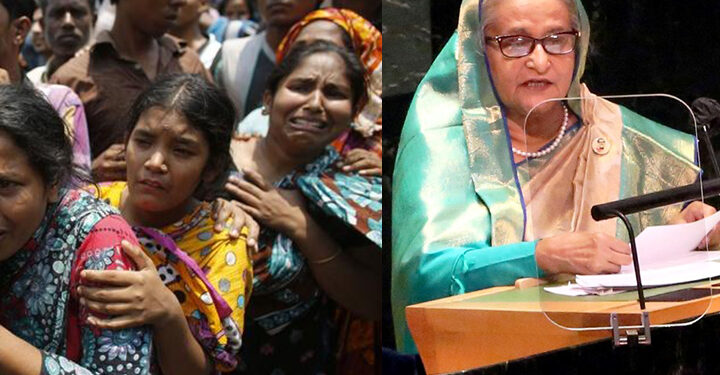Human Tragedy And Political Failure In Bangladesh

Sheikh Hasina is suddenly confronted with a moral dilemma for which her authoritarian political system is unprepared
William B Milam
Courtesy: Friday Times
Among our important worries of today–the new Covid 19 variant Omicron, the Russian threat to invade Ukraine, the kinks in the global supply chain that are a major cause of surging world- wide inflation– the life and death crisis in Bangladesh involving her long-time rival Begum Zia’s serious illness–has not risen above the surface in our consciousness. That is the usual fate of Bangladesh; out of sight, out of mind is where its government would prefer to be. The Awami League (AL) government of Sheikh Hasina, in power since 2009, has managed by living in the shadows of international consciousness to maintain the image of being democratic, while moving slowly but surely on the political path leading to authoritarianism. It took ten years of steady effort to get there, but by my reckoning it arrived at the open authoritarian gate and entered that fetid realm by stealing the 2018 election. The theft was overt and complete. A sure sign of that theft was the Awami League and its allies won about 95% the seats in the Parliament, and it has ruled since then in a de-facto one-party state.
I wrote two weeks ago of the phenomenon that almost every time I see Bangladesh referred to in the media, it is praised justifiably, for its economic performance as well as its progress on social indicators such as education of women and girls, life expectancy, birth rate and many other things, many of which are related on its economic success. But there is either no mention of its political transformation in to an autocracy. Historically, economic growth has continued since 1991 to rise year over year to over 7% before the pandemic struck, poverty has declined by over 60 %, female employment is high and rising, etc. In both economic development and social indicators, Bangladesh ranks higher than most of its South Asian neighbors. This is all very laudable.
However, this great success has been accompanied by the stealthy rise in political oppression and authoritarian governance. All of the usual authoritarian tools have been gradually developed and gradually been deployed to ensure that there is no active functional opposition. Almost all opposition comes from outside. The media has suffered greatly as the AL has pushed through the Parliament severe punishments for those who voice opposition in public. The once active and feisty local media has been reduced those outlets that strictly self-censor to make sure there is no opposition. Any opposition from the media comes from those media workers that have fled the country, often after a term in jail or disappearance. Even those media players are often muffled by government threats to family they have left behind. The government developed pervasive surveillance methods that allow it to rule by fear. In political terms, Bangladesh is now in an Orwellian miasma; while achieving economic and social success, it has transformed itself into a dystopic authoritarian state ruled arbitrarily by fear.
The author of this political transformation is, of course, Prime Minister Sheikh Hasina. Most authoritarian states in today’s world are identified with one person even though, in truth, this person is probably closely aligned with a like-minded clique or party, be it revolutionary or not. I am sure there were other authoritarians with Sheikh Hasina while she led the AL to this absolute power it now has, but it seems to me there is almost always one person in the lead and whom the country, and history, usually recognize as “the leader.” In our time, there are such names as Victor Orban, Alexander Lukashenko, Vladimir Putin associated with the establishment of authoritarian states. Sheikh Hasina rarely is included with these names even though Bangladesh is not much different to Hungary, Belarus, or Russia in the strongarm way they are governed.
Sheikh Hasina’s path to this point, however, was different that the authoritarian leaders mentioned above. She began the journey in 1981 by inheriting the mantle of leadership of the AL from her father, Sheikh Mujib, who was assassinated in 1975. She lived in exile after the assassination until 1981 and came back to Bangladesh two weeks before the assassination of President Zia Rahman, who had formed the other major political party, the BNP. Both parties were then under new management, Sheikh Hasina running the AL, and Begum Zia wh inherited the BNP leadership after her husband was killed. Those two then vied for leadership of the opposition to the military dictatorship that seized power in 1982, and through the 1980s faced off against each other. Though the two were ostensibly on the same side—against the military dictatorship of General Ershad—the “Battle of the Begums, as it came to be called, started then. Both parties (thus both Begums) grew more hostile to each other when the Awami League took part in the election of 1986, while the BNP boycotted the election.
The hostility between Sheikh Hasina and Begum Zia seems to have hardened after that as Zia won great praise for the BNP boycott among many voters. It was said that they could not be in the same room. But that proved to be untrue, at least for a few minutes, as I saw them in the same room with many others after the fall of Ershad in December 1991. The two major parties had finally come together to form the political movement that ended the military dictatorship. The two Begums rivalry continued during what was thought of as a democratic era, although that democracy was very flawed, with elections ever 5 years in which neither party ever repeated. It ended after the 2008 election which gave the AL a large enough majority to change the constitution and rid it of the provision which had prevented wholesale rigging. After that, just as one would expect, the AL (and Sheikh Hasina) have never left office and have marched steadily toward a system in which it can never lose.
This is where Sheikh Hasina always wanted to go. It is not ideology. As far as I can tell, she shows little interest in ideology; she is neither for or against democracy nor totalitarianism; she is only interested in what she thinks the country owes her–permanent power. I gathered this from her actions in 1991, when I was there to observe them. The election was very close; each party received 30% of the vote, but the BNP won by just under 250 thousand votes. I should add that the 1991 election is regarded as the freest and fairest of all the elections, perhaps the only really free and fair election, in Bangladesh history. But the thin margin of victory convinced Sheikh Hasina that the election was somehow crooked, and she spoke out, not accepting the results and promised continuing street action for the coming 4 years. Her threat led to a lot of street violence over the ensuing years. Ironically, it also led to her insisting before the next general election in 1996 on the need for a neutral interim government during the election. That was a call for the caretaker amendment, which was added to the constitution in 1996. She learned, however, that didn’t ensure the AL would be elected at every election. So as mentioned above, she removed that amendment when she had the votes to do it.
And so, suddenly Sheikh Hasina is confronted with a moral dilemma for which her authoritarian political system is unprepared. As a good authoritarian, she did we expected: she got rid of her main opposition by sending Begum Zia to jail. Was the charge of corruption legitimate? The odds are against it, but in Bangladesh, in an authoritarian environment, corruption is pervasive. That is what politics is all about—to give access to those economic rents that go to the government. But Begum Zia has become very ill in jail and the illness has worsened in the past few months. Some reports have her near death. Her doctors are telling the government and the world that the only hope is treatment only available abroad, in the West. I hope they allow her to travel and do so quickly. The government, so far, is citing legal reasons for barring her evacuation to a Western hospital. Perhaps it will relent; perhaps it won’t. Not to do so would, it seems to me, be a very serious mistake for a government now very unpopular in Bangladesh, and now being unmasked by the international community. This was manifest by its failure to get invited to the virtual democracy summit held here in Washington next week. It appears that Bangladesh leaders expected to be invited. It would be nice to think it mattered to Sheikh Hasina, but that is doubtful.

